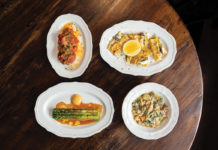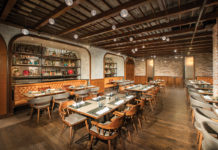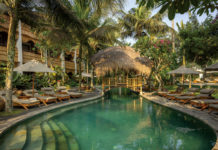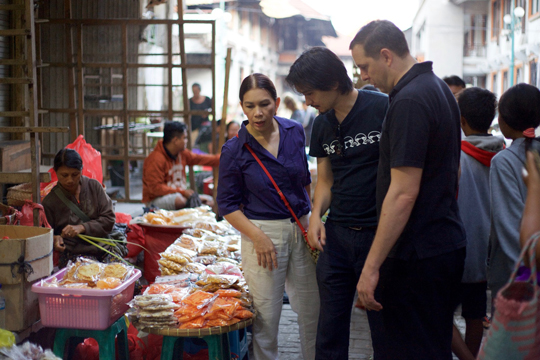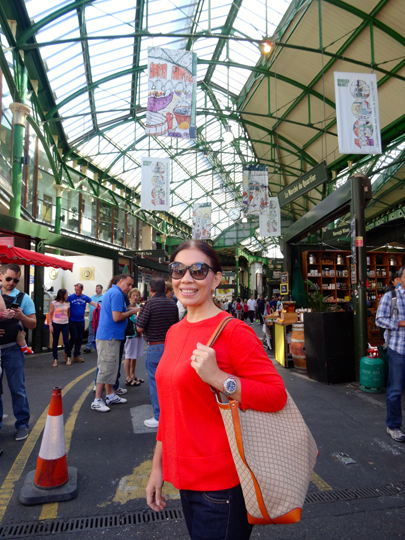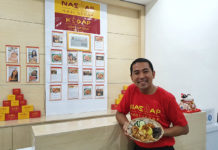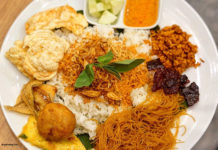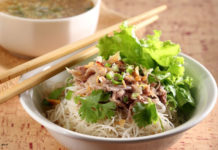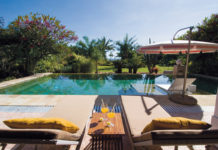Q: Today you are recognised as Indonesia’s well-known chef and author, but how did you first find your passion for food, travel and writing?
A: I think I must have had a natural talent for cooking from when I would cook with my grandmother when I was young, but actually, it wasn’t until later on in life that I discovered my kitchen skills. My husband is British so whilst we were living there, I would entertain friends and neighbours with food and it just so happened that they loved my cooking. I would cook Indonesian cuisine using whatever ingredients I could find, so I guess it was a bit of Indonesian fusion. I would make simple fresh salads with ginger, chilli and lemon dressings, and as more people tried and loved my food, I started doing cooking demonstrations there in England. That was when a friend said to me, Petty, you have to join BBC Masterchef.
Q: You starred on BBC Masterchef in 2001. How did your life change following your television debut?
A: It really gave me so much confidence as a chef and a writer. It was definitely the beginning of my culinary career and now I get lots of opportunities to collaborate with international and local chefs across the world, sharing our ideas and our techniques. I’ve gained so much professional input and inspiration, it has been truly invaluable.
Q: It’s interesting that you discovered your passion and talent for cooking in England – a place that is often renowned for fairly bland food!
A: Yes I know! But I think that’s why English people really love my cooking. They know Indian curries and Thai curries, but not Indonesian curries, so when they taste my rendang, it blows their minds! Of course, I have to tone down the spices a little bit, otherwise I’d be worried they’d have a heart attack!
Q: You clearly love to showcase Indonesia’s regional cuisine across the world. What is the typical reaction to the fiery and complex flavours of the archipelago?
A: I think people are generally very excited, open and welcoming. Indonesian food is very unique but at the same time it shares links with other cuisines that people can relate to, like curries, satays and soto; even gado gado or urap as they’re basically salads with a twist! Unfortunately, when some people think of Indonesian food they automatically assume nasi goreng, so I hope that the more we talk about our cuisine and our culture, Indonesian food will one day rule the world!
Q: You’re doing a pretty good job of promoting Indonesian Cuisine having just published your latest book ‘Jakarta Bites’, a guide to the capital’s street food and Betawi, Jakarta indigenous people cuisine. What can our readers look forward to the inside.
A: The aim of Jakarta Bites is to give people an idea of the varied cuisine available in Jakarta, from all over Indonesia, without having to travel to its regions. It teaches readers about Makanan Betawi, a largely forgotten indigenous cuisine. The recipes in the book have been prepared to be as simple and easy to make as possible, including different tips and tricks for modern cooking and the option of substitutes if certain ingredients are hard to find.
Q: You’re from Manado, North Sulawesi – an island with a very rich culinary culture. Can you tell us a bit about the typical staples and signature flavours of this unique island?
A: Manadonese staples are mostly fish or pork and every dish is crazy spicy! But at the same time, the cuisine is very fresh and tangy because we use lots of lemongrass, lime leaves and tomatoes. Rica-Rica is the signature base spice, and that’s made with chilli, shallots, garlic and ginger with or without tomatoes but we also have very complex recipes too, like in Woku Blanga, which is a fish dish that uses up to 14 different spices and herbs. I actually sometimes make pasta using this Woku Blanga mixture but with added tomatoes and extra seafood!
Q: We love hearing about culinary traditions around the world. What country or region outside of Indonesia has inspired your cooking and your travels?
A: I would say Italy. Italians are very proud of their heritage and their recipes have been handed down through generations from their grandmothers. The ingredients are amazing, too. So simple but beautiful.
Q: Do you have a favourite Italian restaurant here in Asia to recommend to our readers?
A: GIA in Jakarta and Tosca in Hong Kong.
Q: So how would you describe your own style of cooking?
A: I’m very modern but still stay true to the real tastes of Indonesia. Fresh, beautiful, elegant and healthy, my cooking is always easy to follow so that you can create gourmet cuisine in your own kitchen.
Q: Finally, any advice for budding chefs and passionate foodies like yourself?
A: I think it’s very important to have your own personality, to stay true to your heritage and inject that into your cooking. Don’t just follow others, have your own style, work hard and always continue to learn.



